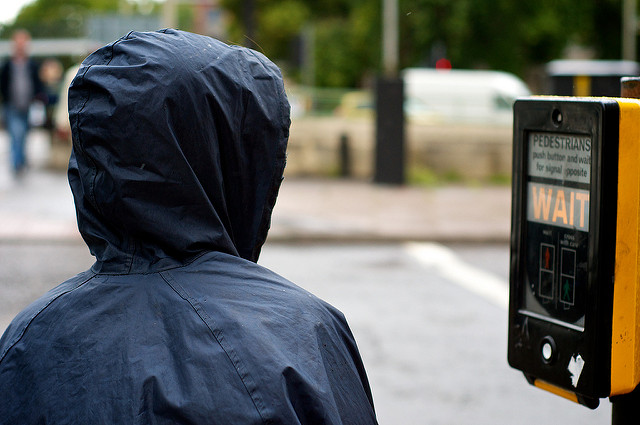
Monastic Patience
We live in a time when patience is understood to be a weakness and not a strength. Our culture tells us waiting for something is oppressive and unfair. Why do we need to wait? Is someone cutting in front of us? Why are they receiving preferential treatment when we are not?
Our society does not value waiting and patience. The ways we work, treat our families, eat, and drive demonstrate we do not value patience. We do not enjoy waiting, and are happy to make sure everyone knows how little we enjoy it. We value our own time and needing to wait for five or ten minutes is a major imposition.
The monks I know get more practice in waiting than the rest of us.
Waiting is Not Being Passive
Part of the reason we do not value waiting is we view it as wasted time. It is easy for us to believe time we spend waiting is us doing nothing, time we will never recover.
We assume people waiting patiently are not standing up for themselves, not demanding action. Our society values progress toward justice, toward fairness. People who expect to be treated fairly may sometimes be annoying, but our culture sees them as heroes.
We do not want people to be harmed by unfairness. At the same time, not every time we need to wait is because of a social injustice.
The fact is I have had some of my best ideas while I was waiting for something else. When we arrive early for an appointment, when the person in front of us is slow, it can be aggravating. Our aggravation, though, is often because the situation demonstrates we are not in control of what happens to us. When we see it as a problem instead of an opportunity, we miss the deeper point.
We may not be recognizing the deeper lessons patience has for us.
Patience at the Hermitage
I am not sure I have ever seen a monk being impatient. Even in challenging situations or dealing with frustrating people, monks tend to maintain an air of genial calm.
Part of monastic patience is the understanding that impatience does not really change anything. My expectation, my desire to move faster, do not usually prompt other people to action. All they really do is make it less pleasant to work with me. Sometimes it makes other people anxious or afraid.
Monastic days are lived in accordance with a set schedule. There are times for rest, reflection, work, and worship. Hurrying does not create more time to accomplish anything.
Impatience, even unspoken impatience, only affects the feelings between us.
There is a sense of patience which envelopes the hermitage, even when there is much to be done. This patience is rooted in an understanding of how time works. We all have the same amount of time each day and the key to living well is using our time wisely. Whether using time wisely is focusing on getting things done or reflecting is a personal choice. The schedule helps us choose, but we are each responsible for our own choices.
Patience in the World
I am not a particularly patient person, and a fairly assertive pedestrian. Living in Southern California, the home of car culture, means I often almost get hit by cars as I cross the street.
Apparently driving a car makes us less patient people. As I walk, I watch how people drive. I can be impatient and enjoy driving fast, but I try not to break the law.
With time and reflection I come to realize monastic patience says as much about me as about anyone else.
When we do not want to wait, do not think we should wait, we are declaring ourselves. We are asserting our own relative importance.
When I do not think I need to wait for someone else I am saying I am more important. I am more valuable and you should wait for me, and not the other way around.
We live surrounded by people whose actions seem to scream they are more important. Except they do not.
We are surrounded by people whose actions scream they need to assert their importance. Their unwillingness to wait tells us they are insecure and anxious about how valued they are. The fact they need to declare it so loudly communicates their fears.
Strengthening Our Own Patience
We want to be certain, inside ourselves, our lives matter. When we feel uncertain, we reassure ourselves by acting in accordance with our desires. We try to fake it until we make it.
The monks who inspire me do not put much energy into convincing themselves of their own significance. They spend time each day reflecting, waiting for the truth to make itself known.
Spending Waiting Time Wisely
People tell me they do not have time to spend on spiritual life. They would love to practice spiritual disciplines but are too busy with work and the other parts of their lives. Particularly in Southern California, people spend so much time driving they cannot focus on spiritual life.
They make me wonder whether, instead of working so hard to avoid waiting, patience might help them find time.
It is easy for us to get caught up in not falling behind. There are so many things we need to do, so many tasks we need to accomplish. We cannot wait for truth to make itself known to us, we need to know now.
If we intentionally spent five minutes each day waiting for someone else perhaps we could find the time.
The more absorbed we become in our own importance the less willing we are to wait. We do not want to wait for other people or for Sacred truths to reveal themselves to us.
As we learn the lessons of waiting we recognize the importance of taking action.
When will we have time to wait with monastic patience?
How important are all the things we are rushing to accomplish?
[Image by alant79]
Greg Richardson is a spiritual life mentor and leadership coach in Southern California. He is a recovering attorney and university professor, and a lay Oblate with New Camaldoli Hermitage near Big Sur, California. Greg’s website is StrategicMonk.com, and his email address is [email protected].












